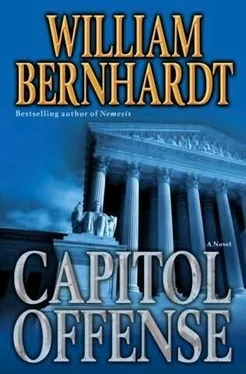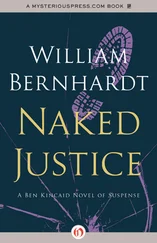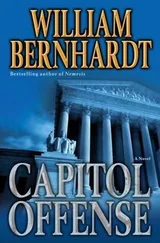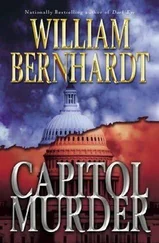“I’d feel better if he had passed this off to an underling.”
“Me too. When the DA himself is on the job, you can be certain of one thing: he doesn’t expect to lose. And he will do everything in his power to make sure he’s not mistaken.”
To their right, Ben saw the all-important jury box, empty for the moment, but soon to be filled with the most important people in the whole drama. Their chairs were rudimentary, and by all accounts uncomfortable, as they were packed shoulder to shoulder in a varnished plywood box. There they would sit in judgment, trying to make sense of conflicting testimony and facts, not to mention complex psychiatric testimony, without even the benefit of being able to take notes. It was a daunting duty, but one, in Ben’s experience, that most jurors took very seriously.
Behind them was the gallery, two sections of twelve rows of churchlike pews. They were completely filled, and Ben knew there were many outside who had not been seated but who would be allowed to watch the proceedings on closed-circuit television in the vacant courtroom next door. There were a few people Ben recognized as prosecution witnesses, but not many. Most would come when they were needed. In many cases, they were not allowed to hear the testimony of other witnesses. Most of the people in the gallery were media professionals. They had the know-how to secure a seat, and the people running the court system wanted to keep them happy. Media coverage tended to be pro-prosecution, if only because they heightened the drama by assuming anyone arrested was probably guilty but might not be convicted. They could say the word allegedly all they wanted; it was like white noise in the background, a sound barely registered and usually ignored.
The players were all assembled, except the one who would be sitting atop the raised bench, front and center. Ben wondered if he had time to run to the bathroom. No, better to tough it out. Although intestinal distress was an unwanted companion to an opening statement, as he knew from experience.
The door from the deliberation room opened and the jurors entered the room. Most of them glanced at Dennis but did not stare. That might be a good sign. Or it could just mean that, given the enormous media coverage, they had no need to stare at a face they already knew quite well. Ben would be watching them carefully once the prosecution started offering its testimony. That could be supremely telling.
The door from Judge McPartland’s chambers opened. The bailiff came in, which for a trial was the equivalent of a raised curtain. The show was about to begin.
“All rise.” The instant the bailiff said the words, McPartland entered and headed toward his chair. He was seated by the time the spiel was over. “The District Court of Tulsa County is now in session, the Honorable Judge Leland McPartland presiding. Please turn off all cell phones and pagers immediately or be held in contempt. This court will now come to order.”
“Please be seated,” the judge said. He gazed out into the gallery, then frowned. This was a charade judges always went through, in Ben’s experience, whenever there was a packed crowd. The judge evinced disapproval, as if somehow the presence of all these people might disrupt the serious business they had to conduct. In reality, Ben suspected, like most showmen, McPartland did not mind having an audience.
The judge nodded at the clerk, who nodded back. Then he did the same with the court reporter. Everyone was ready to roll. He read the case name and number, then read the indictment in short form. He noted that a jury had been selected, then gave the jurors a few preliminary instructions, mostly about the importance of arriving on time each day and not talking to the press. He was not going to sequester them; he expected them to use their own judgment and to stay away from anything pertaining to the case. And with that…
Ben gripped Dennis’s wrist and squeezed it.
Here we go.
Ben knew that District Attorney Guillerman was a man who had earned his job. He hadn’t achieved his current lofty position through connections or privileged birth. He’d made his own way through hard work, smarts, and determination.
Guillerman interned at the DA’s office when he was still at TU law school. With a successful solo practice, he’d managed to generate the support he needed to run for office successfully. Twice. He had a fine record, was an excellent attorney and, perhaps even more important, could efficiently and effectively manage a large office. Although there had been talk about him running for governor, Ben knew he planned to run for reelection and didn’t doubt he would succeed.
“Ladies and gentlemen of the jury,” Guillerman began, “first of all, I want to thank you for being here. I know you have already spent many days in this courtroom and mostly likely will spend many more before we are done. Your seats are not comfortable and the food here is keenly mediocre, so for that and many other reasons, I thank you for your service.” He smiled a little, something the jurors would not see again for some time.
“Sadly, we are here today on a very serious matter, perhaps the most serious offense in all of the criminal justice system. A blatant case of first-degree murder. The evidence we present in this trial will show that the defendant, Dennis Thomas, did in fact with premeditation shoot with the intent to kill Detective Christopher Sentz, a distinguished officer on the Tulsa police force with an excellent record. He was a husband and the father of two daughters. The evidence will show that the defendant believed Sentz should have acted more quickly to investigate the disappearance of the defendant’s wife, who unfortunately perished after a traffic accident. Although the evidence will show that Detective Sentz followed standard procedure at all times, that did not satisfy the defendant. And so on April twelfth of this year, he killed Officer Sentz in cold blood.”
Guillerman pressed his hand against his mouth, then blinked rapidly, as if fighting back tears. After a few moments, he stopped, took a glass of water from his table, and sipped slowly. He was doing a good job and Ben knew it. He was showing emotion, showing he was moved by the tragic loss of Detective Sentz, as he should be. At the same time, he was not going too far. Oklahoma juries, for the most part, were a practical, sensible lot. They could sense a phony a mile away. Guillerman was reminding them of the central horror-a good man dead-without engaging in any obvious playacting.
“The evidence will show that on April twelfth, the defendant took a gun-his gun-to shoot Detective Sentz. He learned that Sentz was in a hotel room at the Tulsa Marriott engaged in an ongoing sting operation. The defendant followed him there, entered his room carrying the gun, and shot him at point-blank range. When the police apprehended him, he was lying on the gun and his prints were all over it. Detective Sentz was dead. Witnesses will testify that they saw the defendant enter the hotel looking angry, determined, and cold-blooded, but entirely in possession of his faculties. He knew what he was doing. And he killed a valuable member of our police department-just as he had planned.”
Ben couldn’t help but admire the flat but effective manner in which the DA had laid out the facts, mentioning everything that helped his case and ignoring everything that did not. He engaged in some speculation, but resisted the temptation to be argumentative, which at this early stage was likely to put the jurors off. He would save that for closing. Ben also noticed that he avoided the potential minefield of the blackout, the hardest aspect of the case for Guillerman to manage. Even if he didn’t accept temporary insanity, he could not deny that something had made Dennis unconscious, unable to be revived for nearly two hours. No doubt he would have some answers. But he knew this was not his strength, so he waited to talk about it until he had no choice. For now, he would present his case as if it were perfectly simple and obvious.
Читать дальше








